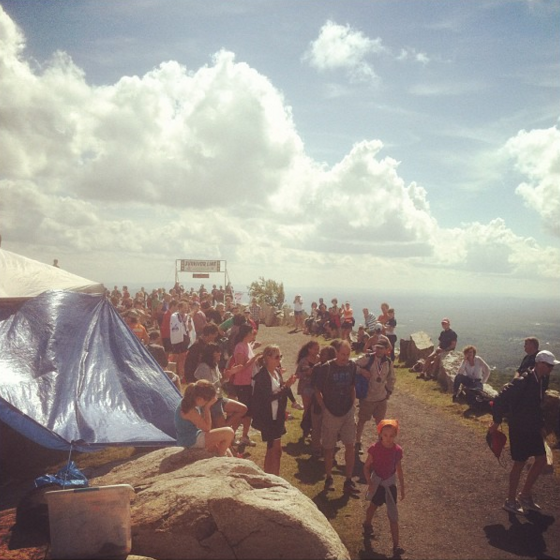FALL 2016
F.A.S.T. Interview:
Each quarter we'll check in with our F.A.S.T. members to provide an opportunity to look at athletics and our team through a different lens. Back to Prof. Garrett, our Men's and Women's Track F.A.S.T.
Enjoy!

Q: What is it like being a professor and a competitive athlete?
I had never been a very competitive athlete. In high school, I ran track and cross country and always did OK. In cross country, I sometimes counted in the scoring as our team’s 5th finisher but mostly not. In track, I might pull in a few points with a 5th or 6th finish in the 3000m; they were often guaranteed points because no one else wanted to do it.
Mindful of the importance of fitness, I had always run a bit, biked a bit and, starting in my late twenties, swum a bit. I did some triathlons in my early thirties, a few 5ks, a half-marathon here or there but was never really competitive. Honestly, I was slow and more or less didn’t think I would ever get faster.
In 2014, my sister convinced me to do the Raleigh Half Ironman triathlon with her. While training for that race, my running started to get faster. I was running with intensity instead of the not too slow, not too fast pace I had been running for years. I started to wonder what I could do if I actually tried.
So for the past two years, I have been having fun seeing what I can do as a runner and triathlete and learning a lot about what it takes to perform during a race. One very important thing for me is preparing mentally. In addition to setting goals and thinking through the various parts (swim/bike/run or first mile, second mile, etc) I need preparation for what I might feel like physically and emotionally on race day.
My first 3.5-hour bike ride as I was training for Raleigh Half IM is a good example of that preparation in action. It was my longest ride EVER and as soon as I finished I was supposed to run 10’ hard. Three hours into that ride I was near tears, everything hurt and I didn’t see how I could walk much less run, much less run hard once I got home, if I ever got home! The thought of coming off a ride like that and running 13.1 miles (as would be required in Raleigh) was incomprehensible. I was convinced this triathlon was going to be a complete disaster! Somehow I made it home, put on my running shoes and ran. The act of doing that run, a run that 30’ earlier seemed totally impossible, was the start of beating down the doubt. It took several weeks before I realized that a lot of the doubt was gone – I would be able to finish and maybe finish strong.
For each race I do that doubt seems comes back, sometimes with its friend fear. I am afraid of how horrible it will feel to run 5 miles as fast as I can, afraid that I won’t PR or place and afraid I will give up. The other athletes intimidate me. I doubt that I have what it takes. But then I go out there and try. I don’t always hit my goal but I have placed and had PRs in my last few races! Always I learn something to apply in the next race.
As I get more experience training and competing, I see how what it takes to achieve as an athlete is similar to what it takes to achieve off the race course. In graduate school, I had an experience where I was near tears and thought I wouldn’t continue just like that 3.5h ride/run. While applying for faculty positions, the moments of doubt are too numerous to count. Writing grants and papers constantly require that I beat the doubt into submission, especially after a rejection. To me this is similar to standing on the starting line of a race with a lofty goal; it would be easier to just not try than risk failing. But if I had let the doubt win in graduate school or applying for a job or submitting a grant or paper, then what? I wouldn’t be at this great place working with awesome students and colleagues. When the doubt comes, as hard as it is to do, I will choose to beat it down and put myself out there and see how far (and fast!) I can go.
Thanks for taking the time to give us a different perspective and we appreciate having you and Jay supporting our student-athletes.
| Men's and Women's Cross Country F.A.S.T. | Men's and Women's Track F.A.S.T. |
| Dr. Jay Bean | Dr. Teresa Garrett |
| Professor of Psychology and Neuroscience | Associate Professor of Chemistry |
| Fun Fact: Jay used to compete in many local road races and took up rowing for many years. | Fun Fact: Teresa has competed in many cycling and triathlons including the 2015 Survival of the Shawangunks in New Paltz, NY. |

